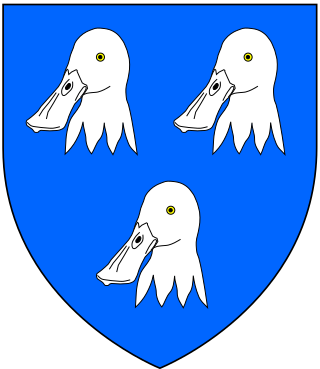
Edmund Lacey was a medieval Bishop of Hereford and Bishop of Exeter in England.

The Very Revd. John Herbert Severn Wild (1904–1992) was Dean of Durham and Master of University College, University of Oxford.
John Browne (1687–1764) was an Oxford academic and administrator. He was Fellow and Master of University College, Oxford, and also served as vice-chancellor of Oxford University.

Revd Dr Thomas Cockman, Doctor of Divinity (1675–1745) was an Oxford academic and administrator. He was Master of University College, Oxford.
Thomas Bennet, also spelt Benet, was an English academic at the University of Oxford.

Richard Clayton was a Canon, Oxford academic and administrator. He was Master of University College, Oxford, from 1665 until his death in 1676.
James Dugdale was an Oxford academic and administrator. He was Fellow and Master of University College, Oxford.
John Martyn, also known as John Marten, was a Master of University College, Oxford, England.
John Crayford was a Master of both Clare College, Cambridge, and University College, Oxford, England. Martyn was unusual in being a Master of colleges at both the universities of Oxford and Cambridge. He was the only Master of University College to also have been a Master at a Cambridge college.
William Gregford was a Master of University College, Oxford, England.
John Roxborough was a Master of University College, Oxford, England.
Richard Salveyn was a Master of University College, Oxford, England.
George Ellison was a Master of University College, Oxford, England.
Anthony Salveyn was a Master of University College, Oxford, England.
Thomas Benwell was a Master of University College, Oxford, England.
Richard Witton was a Master of University College, Oxford, England.
Robert Burton was a Master of University College, Oxford, England.
John Castell was a Master of University College, Oxford, and later a Chancellor of the University of Oxford. Castell was a Fellow of University College. He became Master of the College circa 1408. He also held preferment in the Diocese of York with his mastership. In 1411, a sentence of excommunication was issued by the Archbishop of Canterbury, Thomas Arundel, against Castell, Fellows at the College — Robert Burton, John Hamerton, and Adam Redyford — and the College as a whole, due to Lollardy leanings. An appeal to the Pope against the excommunication was made by the bursar of the College, John Ryvell. Castell survived the controversy and continued as Master until 1420.
Thomas Duffield was a Master of University College, Oxford, England. Duffield became Master of the College in 1396 and remained in the post until 1398.
Robin Haydon Darwall-Smith FRHistS is a British archivist, based in Oxford and associated with several Oxford University College archives.




